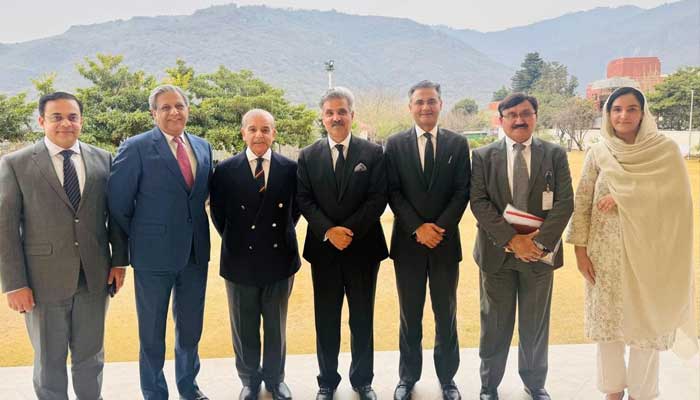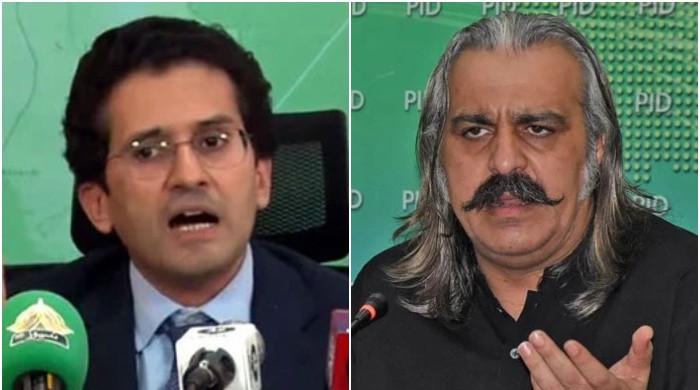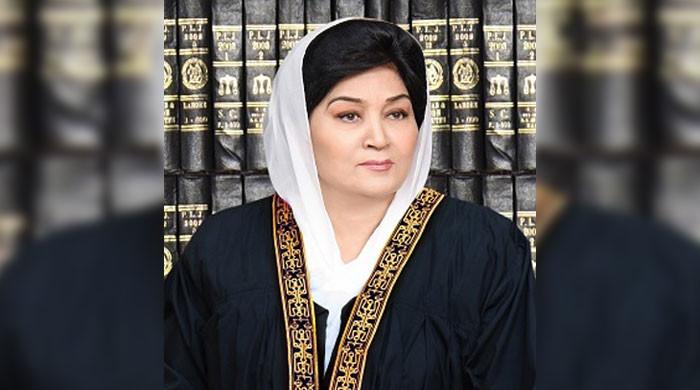In meeting with PM, CJP affirms taking opposition's input for 'sustainable reforms'
Premier assures top judge of accelerating effective measures regarding missing persons
February 19, 2025

- CJP shares agenda of NJPMC meeting with PM Shehbaz.
- Premier agrees on providing govt's input on reforms soon.
- Apprises CJP of long-pending tax disputes in courts.
Chief Justice of Pakistan (CJP) Yahya Afridi has assured taking opposition parties’ input for the judicial reform programme during his meeting with Prime Minister Shehbaz Sharif on Wednesday.
According to a press release issued by the Supreme Court, the premier visited the chief justice's house at the invitation of the CJP Afridi.
He was accompanied by Law Minister Azam Nazeer Tarar, Economic Affairs Minister Ahad Cheema and Attorney General for Pakistan (AGP) Mansoor Usman Awan. SC Registrar Muhammad Salim Khan and Secretary Law and Justice Commission Tanzeela Sabahat were also present on the occasion.
During the meeting, the chief justice shared the agenda of the upcoming meeting of the National Judicial Policy Making Committee (NJPMC) and sought the input of the government.
"The move is part of the chief justice's overall reform agenda intending reduction in the pendency and providing speedy justice to the people of Pakistan," it stated.
He informed PM Shehbaz that he would also be taking the opposition parties’ input and wishes that his reform programme should carry bi-partisan support so that the "reforms are consistent, sustainable and more impactful".
The prime minister appreciated the reform package and agreed the government would provide its input soon.
Separately, a statement issued by the Prime Minister's Office stated PM Shehbaz appreciated the chief justice's initiative to visit remote areas of South Punjab, Interior Sindh, Balochistan, and Khyber Pakhtunkhwa and to consult with all stakeholders for effective and timely delivery of justice.
Apprising the chief justice of the long-pending tax disputes in various courts, he requested the top judge to ensure timely decisions on these cases based on merit. The premier also assured the top judge of accelerating effective measures regarding missing persons.
Earlier on Feb 11, CJP Afridi — during an informal conversation with journalists — said he had invited PM Shehbaz and Leader of the Opposition Omar Ayub Khan to propose improvements to the justice system, which will be taken up in the upcoming NJPMC meeting, expected at the end of February.
However, he clarified that the final decision rests with the NJPMC, and high courts, as independent entities, may reject certain suggestions.
The chief justice has undertaken transformative changes to modernise the judiciary to uphold fairness, transparency, and accessibility to meet standards for judicial excellence and ensuring that the justice system remains citizen-centric and responsive to the litigants needs, stated a press release by SC.
An official announcement said that advanced information technology systems have been integrated to enhance judicial efficiency, including the e-Affidavit system, which streamlines filing processes, reduces delays and ensures transparency, and a Case Management System enabling litigants and lawyers to instantly access certified case copies, eliminating traditional dispatch delays.
To promote transparency and public trust, feedback mechanisms involving legal practitioners, litigants, and civil society have been introduced, it said.
Recognising the vital role of the district judiciary, the CJP paid a visit to remote and underserved districts to assess grassroots challenges, enhance institutional capacity and address resource gaps, ensuring equitable access to justice and strengthening public confidence in the judicial system.












